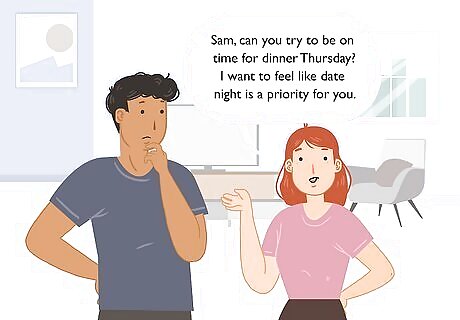
views
Choosing a Positive Mindset

Figure out the root causes. In order to combat your insecurity, it will be useful to figure out why you feel that way. There is often more than one cause, and there is likely no easy answer. Take some time to reflect on your life — both past and present. Make a list of times you felt insecure. Identifying the things or people that make you feel insecure can help you figure out ways to fight those feelings. Consider things like: Have you experienced trauma? Crisis? A major loss? Is there a current situation or a situation in the past that has upset your daily life? Examine your childhood and your relationship with your parents. Were they supportive? Were they hard on you or did they push you to succeed? Look at the list. Try to determine what seems to trigger insecurity — look for connections between times when you felt insecure and what was going on in your life and what other emotions you were experiencing. When do those feelings arise? Who are you with? What are you doing? For example, do you always feel insecure around your older sister? Or do you feel insecure about your body after looking at magazines? Maybe your insecurities arise from comparing yourself to others.

Choose to move forward. Maybe you realize that there are things in your past that have caused your insecurity. Or, maybe your anxiety stems from your current situation. Either way, choose to accept the past and move on. Moving forward will help you to overcome your insecurities. Maybe you had or have a co-worker who constantly puts you down. Make an active choice to eliminate that part of your life. Ask your boss if you can work on a different project or team. If that is not possible, say to yourself, "I am making a choice to ignore the negative things that Tom says to me."

Change your attitude. Sometimes you cannot change your situation. For example, maybe you still live in your hometown, and you have a lot of unpleasant memories associated with the place. But you can't move because you need the excellent job that you have. This is the time to choose a different attitude. Remember that optimism is a choice. Instead of thinking, "I'll never get out of here," try saying, "I'm going to appreciate my new city a lot when I do get to move someday." Try using positive words. For example, you can say, "I am hopeful that someday I will be able to move to a new place that I am excited about."

Accept yourself. When you're feeling insecure, it can be easy to be critical of yourself; however, make an effort to accept yourself just the way you are. You will probably see that changing your mindset in this way can make a big difference. Does your insecurity stem from the fact that you have always struggled with sports? Try to accept the fact that some people just aren't athletic. Say to yourself, "It's ok that soccer isn't my thing. I can still have fun cheering on my friends!"

Focus on your strengths. Insecurity can cause you to feel pretty down on yourself. Instead of thinking about your flaws, make it a point to celebrate your strengths. Try making a list of all of the great qualities you have. Leave post-it notes around your house that say things like, "I'm an honest and loyal friend" or "I am a really hard worker." Whenever you have a negative thought about yourself, read one of the notes. It might make you feel more positive.

Seek professional help if necessary. If your insecurities are getting in the way of your daily life, such as preventing you from completing regular tasks or interact with others, then you may want to consider speaking with a mental health professional. Consider a therapist who specializes in cognitive behavioral therapy (CBD), which can be particularly effective in addressing insecurities. Your therapist can help you insecurities, identify your strengths, and stay focused on your positive traits.
Boosting Your Confidence

Be kind to yourself. One of the best ways to conquer insecure feelings is to become a more confident person. That might seem tough, but once you've changed your mindset, you are already well on your way! Make sure to ease up on yourself and treat yourself the way you want others to treat you. We all make mistakes. It's a fact of life. When you forget to pick up the groceries you need for dinner, try not to be hard on yourself. Instead, try thinking, "It's not that big of a deal. I'll have a sandwich tonight, and make sure I remember the groceries tomorrow."

Practice self-care. Self-care means making sure that all of your needs are being met. Sure, you know it's important to care for your physical health. But don't forget to make time to meet your emotional needs, too. This also includes taking care of things like bathing and personal hygiene, eating well, taking any necessary medications, keeping appointments, and so on. Make time for yourself everyday. Choose an activity that is relaxing to you. For example, allow yourself time to read a chapter of a novel each day. Or try taking a relaxing bubble bath.

Get moving. Physical activity has been shown to be a real mood booster. Getting in shape is a great way to help build your confidence. Look for ways to add some more activity to your life. Walk more. Take a stroll around the block at lunchtime. Try walking to the movies instead of driving. Take a class. Learn to love a new type of exercise. Consider taking a barre or HIIT class at your local studio or gym.

Be assertive. If you're feeling insecure, you might have trouble speaking up for yourself. Remember, your needs are just as important as the needs of others. Work on being more assertive and you'll start to feel more confident. For example, maybe your older sister makes you feel insecure with her frequent put downs. The next time she says, “Don't let Linda be in charge of dinner. She's a horrible cook!”, speak up. You can say, “I'd love to host Thanksgiving this year. I've been working really hard to become a better cook, and I think I'm getting good!”

Set clear goals. When you have a plan, you'll feel more in control. In turn, you'll begin to feel more confident. Take some time to set some goals. You can include both long-term and short-term goals. For example, a short-term goal might be: “I will talk to at least two new people each week.” A long-term goal could be, “I will improve my work performance and one year from now I will ask for a raise.”
Building Supportive Relationships

Evaluate your current relationships. Sometimes insecurities come from within, but they are often brought on by other people. Take some time to reflect on your current relationships. Is there someone who is constantly bringing you down? For instance, think about your relationship with your parents. Do you feel insecure because they constantly put you down? Or maybe your issues stem from work. Do you have a coworker who refuses to recognize your contributions to the team?

Surround yourself with positive people. If you find that there are negative people in your life, look for ways to limit your contact with them. If you are around positive people, you are more likely to feel secure. If your brother is part of the problem, try to limit contact with him and focus on the family members who are supportive. You can tell your Mom, “I'm sorry I can't make the family picnic next Saturday. But I'd love to spend some one on one time with you. Can I take you to dinner next week?”

Make your needs clear. Relationships that are positive will make you feel good about yourself. In order to strengthen your relationships, communicate your needs to others. These can be emotional or logistical needs. For example, you might say to your sister, "I need you to support me in my efforts to get in shape. Can you be a positive workout buddy for me?" Maybe it makes you feel bad when your husband is always late for date night. Try saying, "Sam, can you try to be on time for dinner Thursday? I want to feel like date night is a priority for you."

Set boundaries. It can be really helpful to create a barrier between yourself and the people or situations that make you feel insecure. Defining boundaries is a great way to make sure you have the emotional space that you need. Make a list of lines that you would like to draw. For example, if your dad causes you some anxiety you could set this boundary: "Instead of meeting Dad for dinner, I will meet him for a brief coffee break. That way, I can set a clear time limit." Maybe you are insecure about your dancing skills. Make a deal with yourself: attend your friend's wedding, but come up with a gracious way to decline invitations to hit the dance floor.



















Comments
0 comment